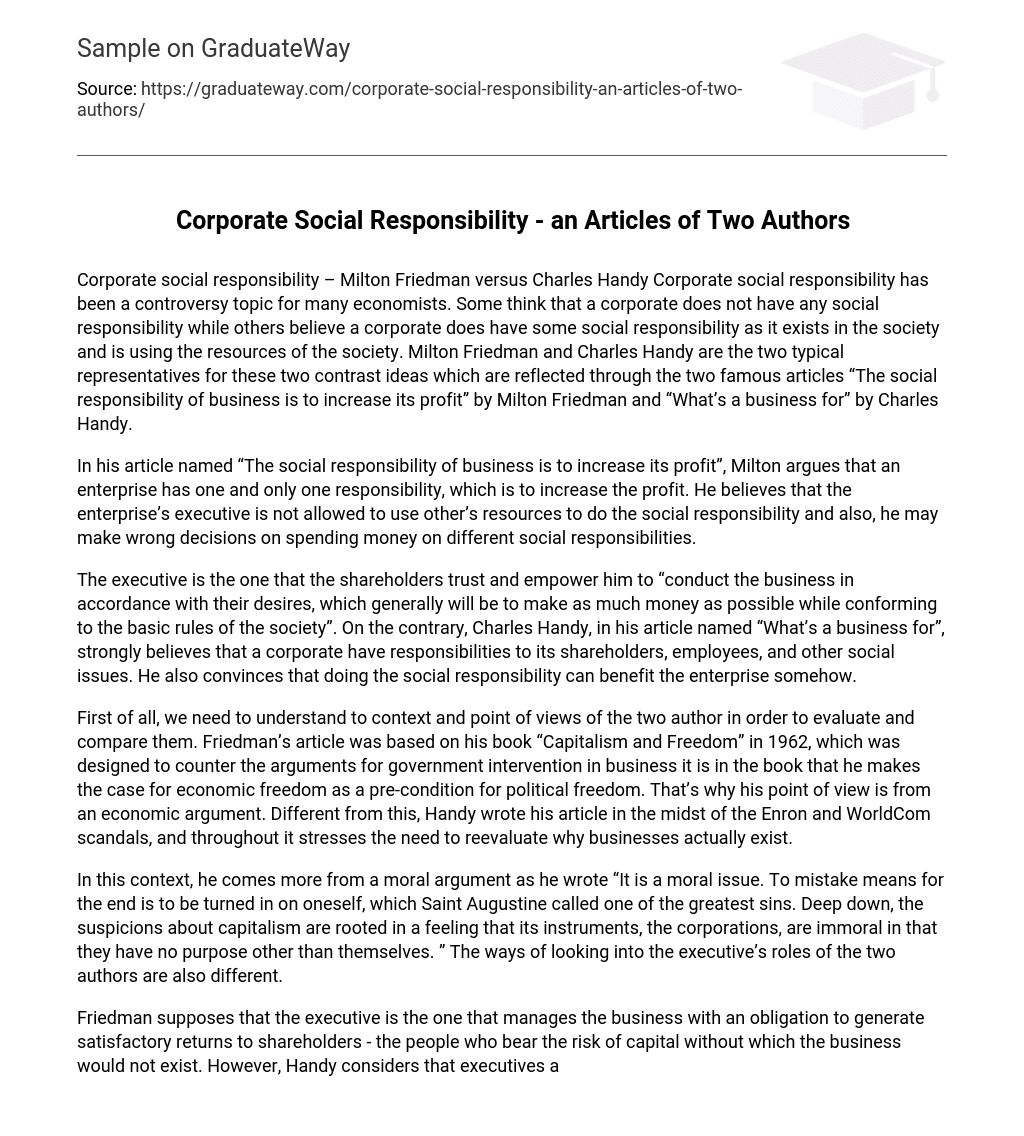Corporate social responsibility – Milton Friedman versus Charles Handy Corporate social responsibility has been a controversy topic for many economists. Some think that a corporate does not have any social responsibility while others believe a corporate does have some social responsibility as it exists in the society and is using the resources of the society. Milton Friedman and Charles Handy are the two typical representatives for these two contrast ideas which are reflected through the two famous articles “The social responsibility of business is to increase its profit” by Milton Friedman and “What’s a business for” by Charles Handy.
In his article named “The social responsibility of business is to increase its profit”, Milton argues that an enterprise has one and only one responsibility, which is to increase the profit. He believes that the enterprise’s executive is not allowed to use other’s resources to do the social responsibility and also, he may make wrong decisions on spending money on different social responsibilities.
The executive is the one that the shareholders trust and empower him to “conduct the business in accordance with their desires, which generally will be to make as much money as possible while conforming to the basic rules of the society”. On the contrary, Charles Handy, in his article named “What’s a business for”, strongly believes that a corporate have responsibilities to its shareholders, employees, and other social issues. He also convinces that doing the social responsibility can benefit the enterprise somehow.
First of all, we need to understand to context and point of views of the two author in order to evaluate and compare them. Friedman’s article was based on his book “Capitalism and Freedom” in 1962, which was designed to counter the arguments for government intervention in business it is in the book that he makes the case for economic freedom as a pre-condition for political freedom. That’s why his point of view is from an economic argument. Different from this, Handy wrote his article in the midst of the Enron and WorldCom scandals, and throughout it stresses the need to reevaluate why businesses actually exist.
In this context, he comes more from a moral argument as he wrote “It is a moral issue. To mistake means for the end is to be turned in on oneself, which Saint Augustine called one of the greatest sins. Deep down, the suspicions about capitalism are rooted in a feeling that its instruments, the corporations, are immoral in that they have no purpose other than themselves. ” The ways of looking into the executive’s roles of the two authors are also different.
Friedman supposes that the executive is the one that manages the business with an obligation to generate satisfactory returns to shareholders – the people who bear the risk of capital without which the business would not exist. However, Handy considers that executives are “the people (… ) [who] are put in place to make decisions that are best for the company as a whole with all its stakeholders in mind”. It also implies that Friedman takes the shareholders as the centre of the responsibility while Handy sees that this includes a group of people and issue.
In Handy’s point of view, the centre of responsibility include the shareholders, who are “important because they are basically investors that provide funds to help companies improve themselves, however they are typically not involved in the everyday operations”; employees “who contribute their time and talents rather than their money, should have some rights”; environmental and social sustainability as “business needs a sustainable planet for its own survival, for few companies are short-term entities; they want to do business again and again, over decades”; and human sustainability when he cares about the work-life balance in a “long-hours culture”. The last point I want to compare between the two points of view is that Friedman considers doing social responsibility is an expense while Handy says that it is a chance of making profit as “Profit often comes from progress”. Friedman uses three examples to argue: lowering price, reducing pollution and providing work for the so-called “hardcore” unemployed.
Contrary to this opinion, Handy believes that “doing good does not necessarily rule out making a reasonable profit” and supports his arguments with examples of Unilever and Citicorp serving the developing world through rethinking technology. In conclusion, the two authors give us interesting points of view and their arguments on social responsibilities of a corporate. However, I believe that Handy’s opinion matches the modern world’s belief and “it’s time to discard the popular belief that corporations must focus first and foremost on maximizing value for shareholders. That idea is inherently, and tragically, flawed. ” We need to understand that making profits is just the means to the end of fulfilling core business mission – the real reasons for the business’s existence.





